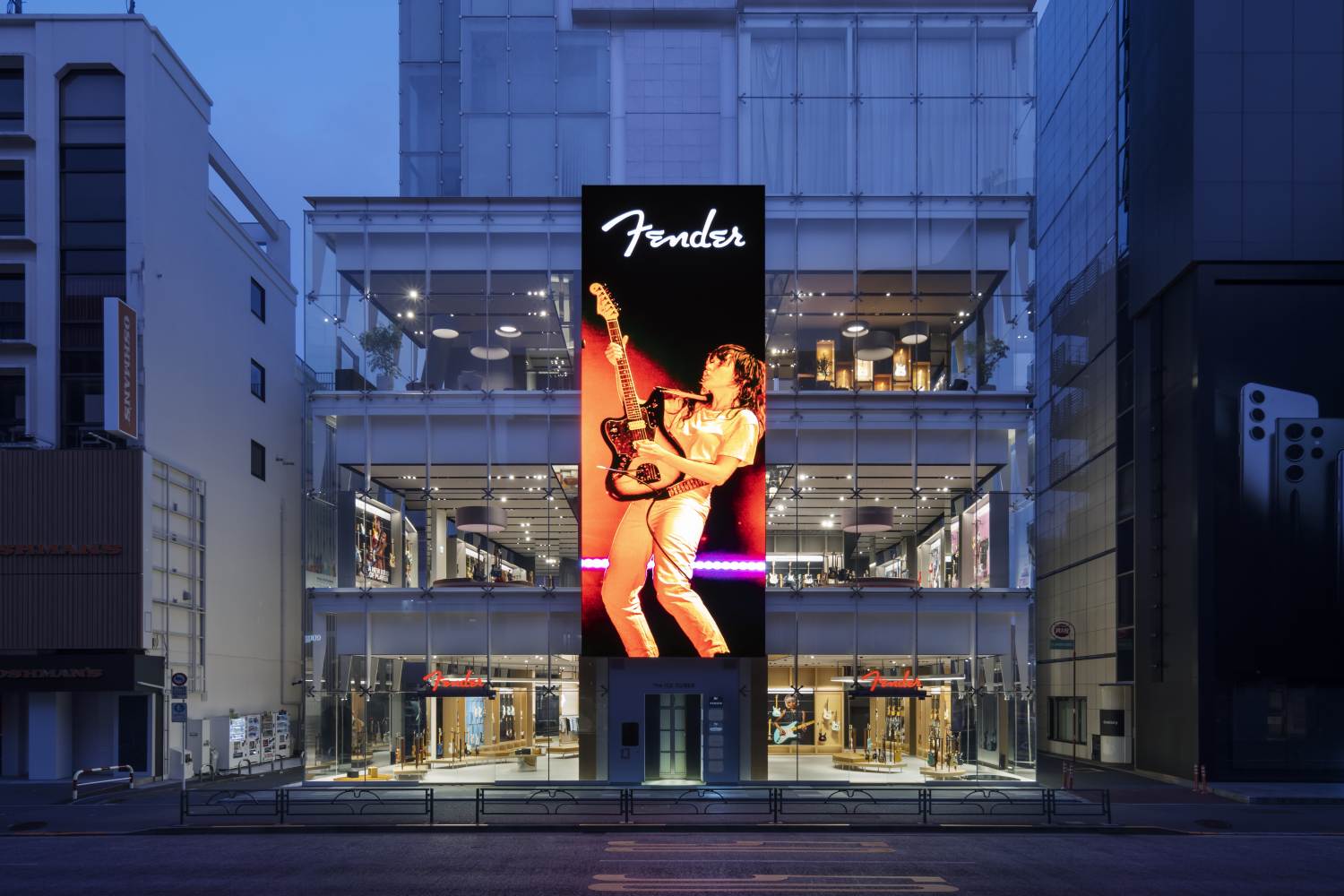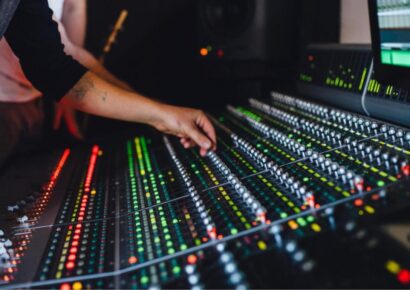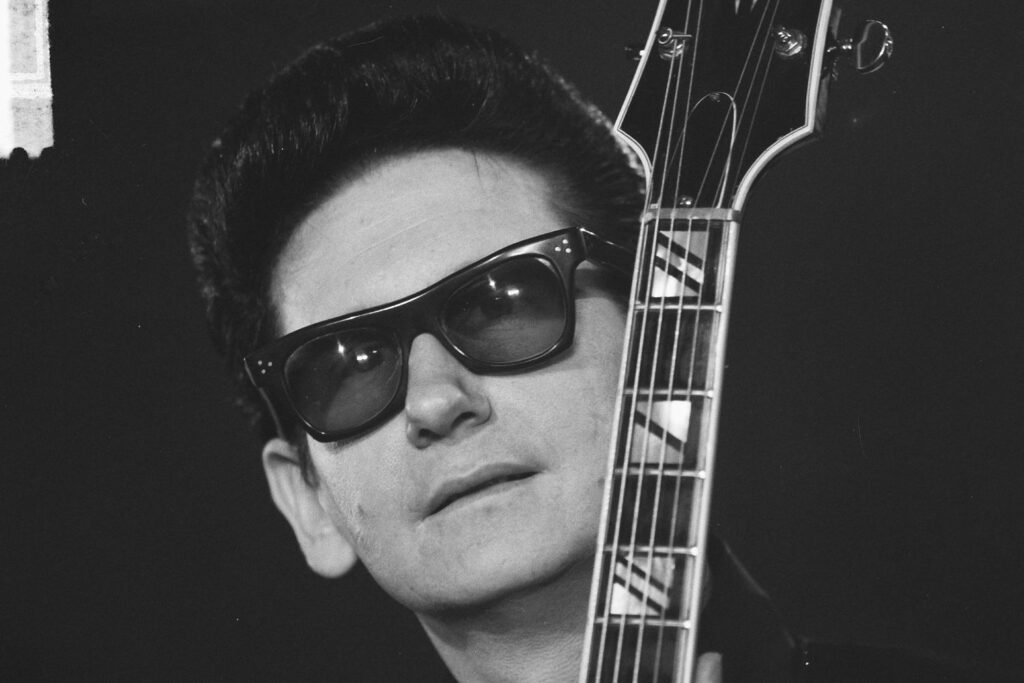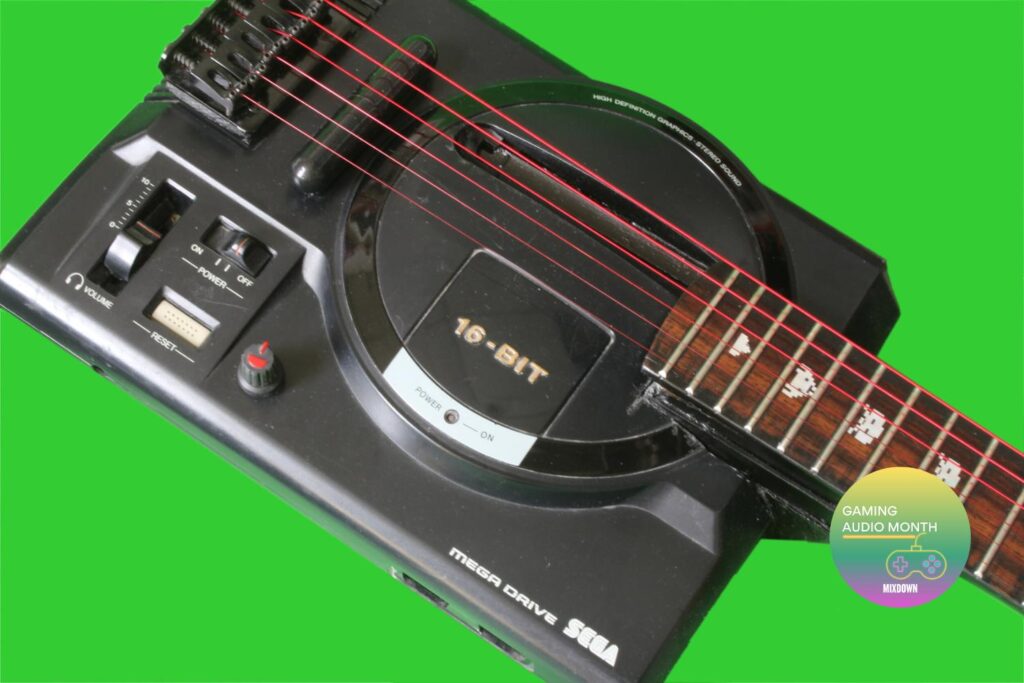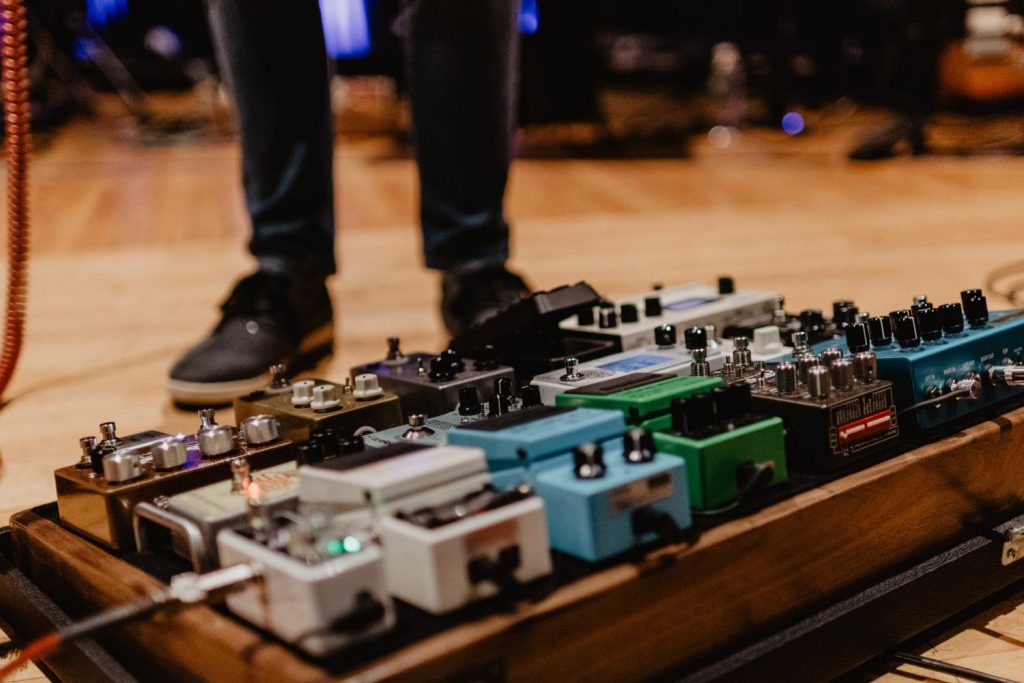A look inside Fender's inaugural retail space in Omotesando-Harajuku - Fender Flagship Tokyo.
There is a certain duality to the Fender guitar. Pausing to linger in front of one of the dozens of wall-mounted Stratocasters displayed in the brand’s inaugural flagship store, which has recently opened its doors in Tokyo, Japan, I’m struck by the instrument’s profound simplicity. From its clean, classic shape, so familiar, it’s often the first image that springs to mind when one hears the word ‘guitar’, to the tonal clarity and rock-solid manufacturing that make it a utilitarian work-horse applicable to so many genres and playing styles. And yet simultaneously, the Strat is a cultural symbol of revolution – pictured slung across the chests of countless rule-breakers and renegades who’ve immeasurably changed the course of music history.
Read up on all the latest features and columns here.
When you first enter Fender Flagship Tokyo, which finds its home in the iconic ‘Ice Cubes’, a building situated in the bustling fashion-hub of Omotesando-Harajuku, there’s a large mural with a quote from Leo Fender emblazoned on it behind the counter, reading:
“Artists are angels and our job is to give them wings to fly.”
For decades, Fender guitars have been just that: the strong, capable foundations that provide a conduit for the unwieldy, airborne creativity of artists, and the brand’s first flagship store is truly an extension of this dynamic. This is an environment in which musicians and music-lovers will find vehicles for their craft under the assured guidance of reliable experts. However, more importantly, it is an environment in which they are sure to feel inspired.
“The average person goes to a guitar store online six to seven times before they pick up a guitar – a lot of people, right? So if they’re inspired, that actually helps them get very focused on what they want,” Edward “Bud” Cole, Fender’s APAC President, tells me.
“So with the store, we knew the first floor would all be about what we believe in.”
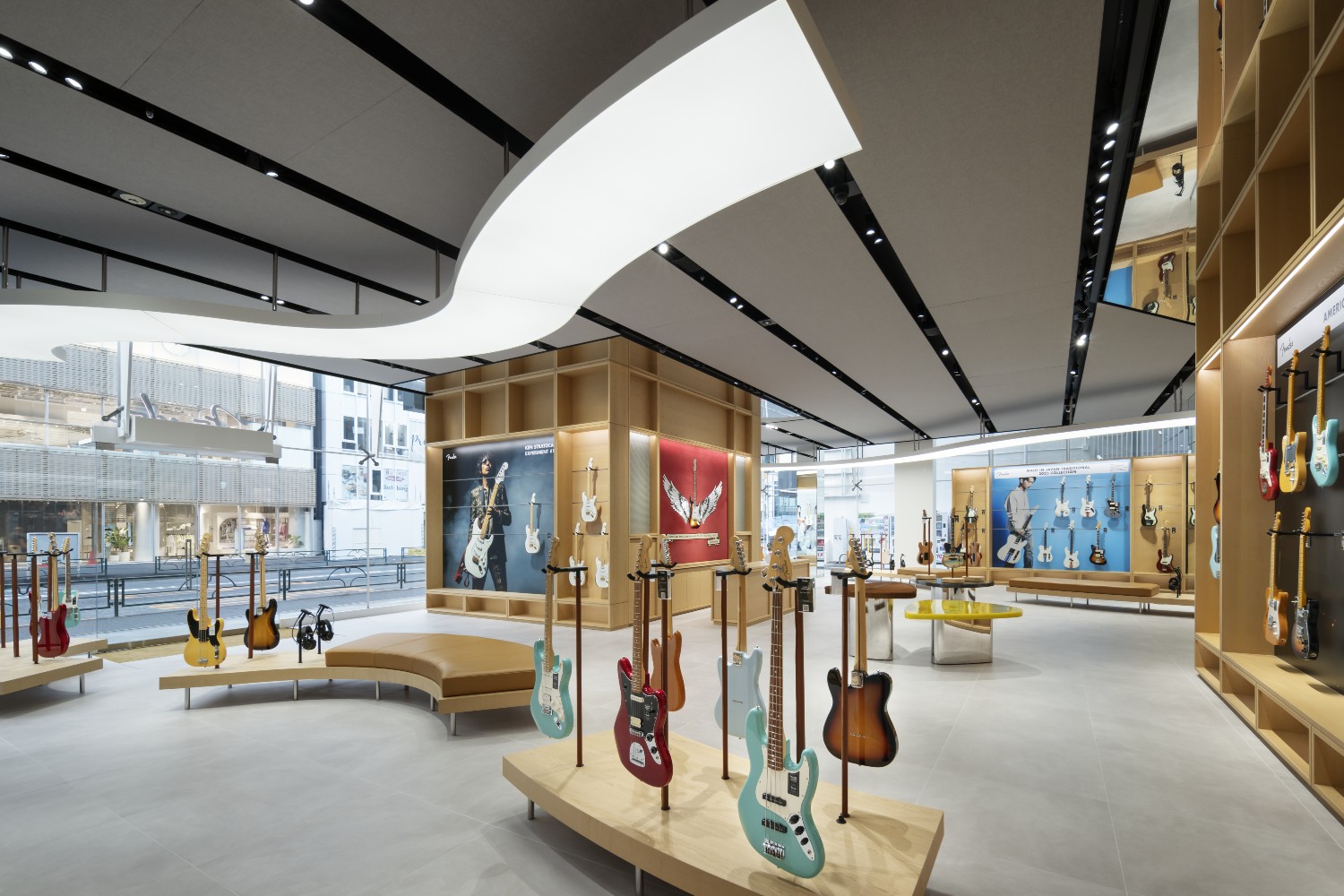
With the aesthetically soothing, white-walled spaciousness of a modern art gallery, the first floor in question showcases newly released and featured products, including electric and acoustic guitars, basses, artist signature models, and accessories. Additionally, there is a space dedicated to the company’s brand new line of apparel, F is for Fender – a collection inspired by the history of guitar in music culture with a Tokyo-centric, clean-lined, urban aesthetic.
“We know that fashion does not drive music, music has always driven fashion,” says Cole.
“We thought that it was important that [F is for Fender] have a point of view, not only from our normal offerings and accessories, and T-shirts and things like that, but a more elevated and a more stylised product line. It’s about celebrating music, celebrating festivals, getting out and going clubbing and seeing bands – stuff like that. And that’s really what we tried to capture in the design – in the fit and the sensibility.”
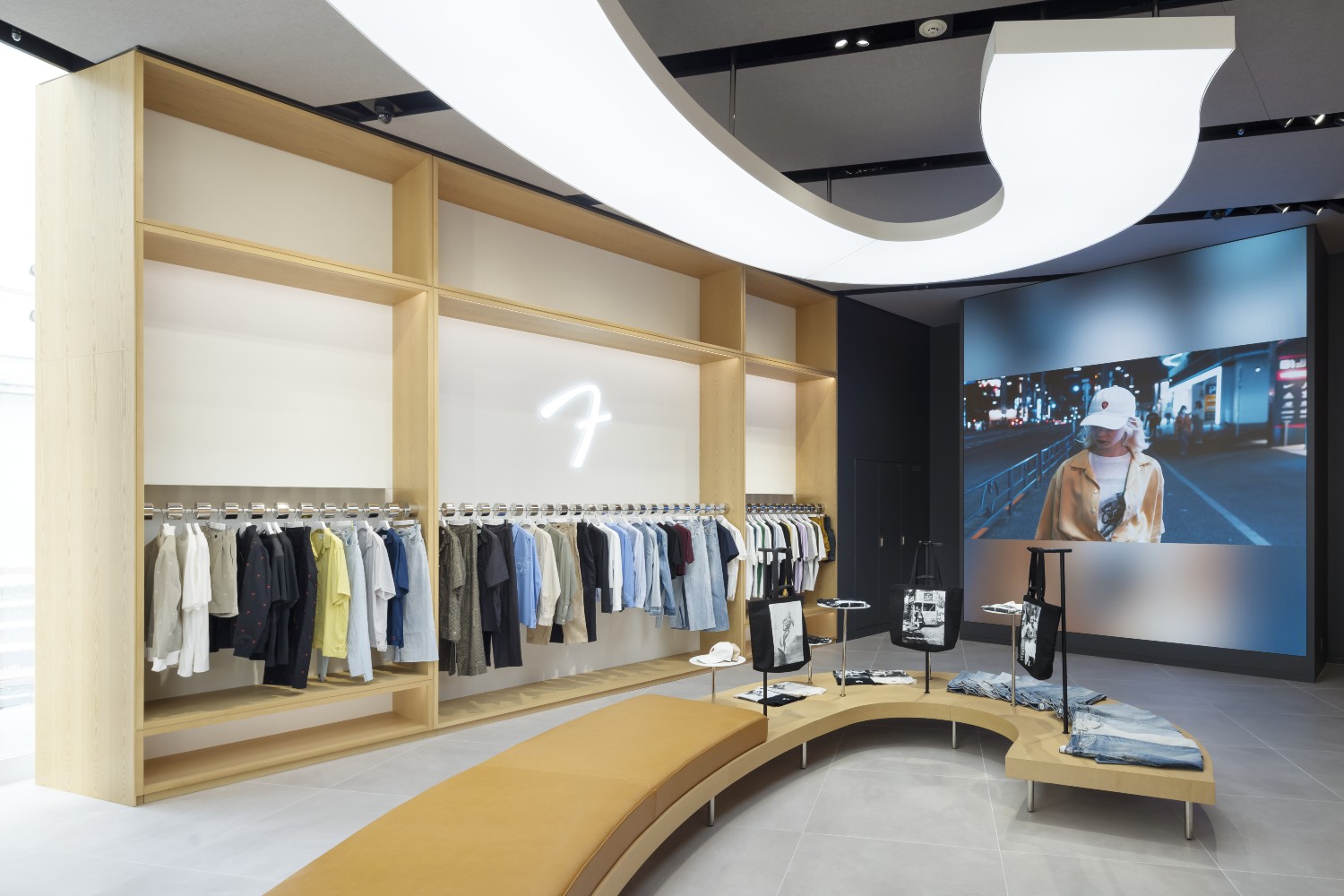
A particular guitar-related highlight on display in the store’s first point of contact is a limited range of Acoustasonic Telecasters featuring the iconic works “Thirty-six Views of Mt. Fuji” and “The Great Wave off Kanagawa” by renowned Ukiyo-e artist of the Edo period, Hokusai Katsushika. It’s a release that simultaneously celebrates Fender’s recent technological innovations and the singular legacy of Japanese design and craftsmanship throughout history – a legacy that overlaps with Fender’s own in myriad ways.
Being that the brand’s momentous first venture into brick and mortar retail is taking place in a country with which it has such a storied history, it is unsurprising to find that paying homage to Fender made in Japan guitars, which have been in production since the 1980s and have developed a devout cult following in subsequent decades, has been prioritised throughout the store’s design and layout. Take the second floor, for example:
“There’s half of a floor dedicated to made in Japan,” says Fender CEO Andy Mooney.
“It is the biggest collection of made in Japan guitars anywhere in the world,” adds Cole.
“They’re amazing guitars. They’re unique, too, still very, very Fender, but very unique.”
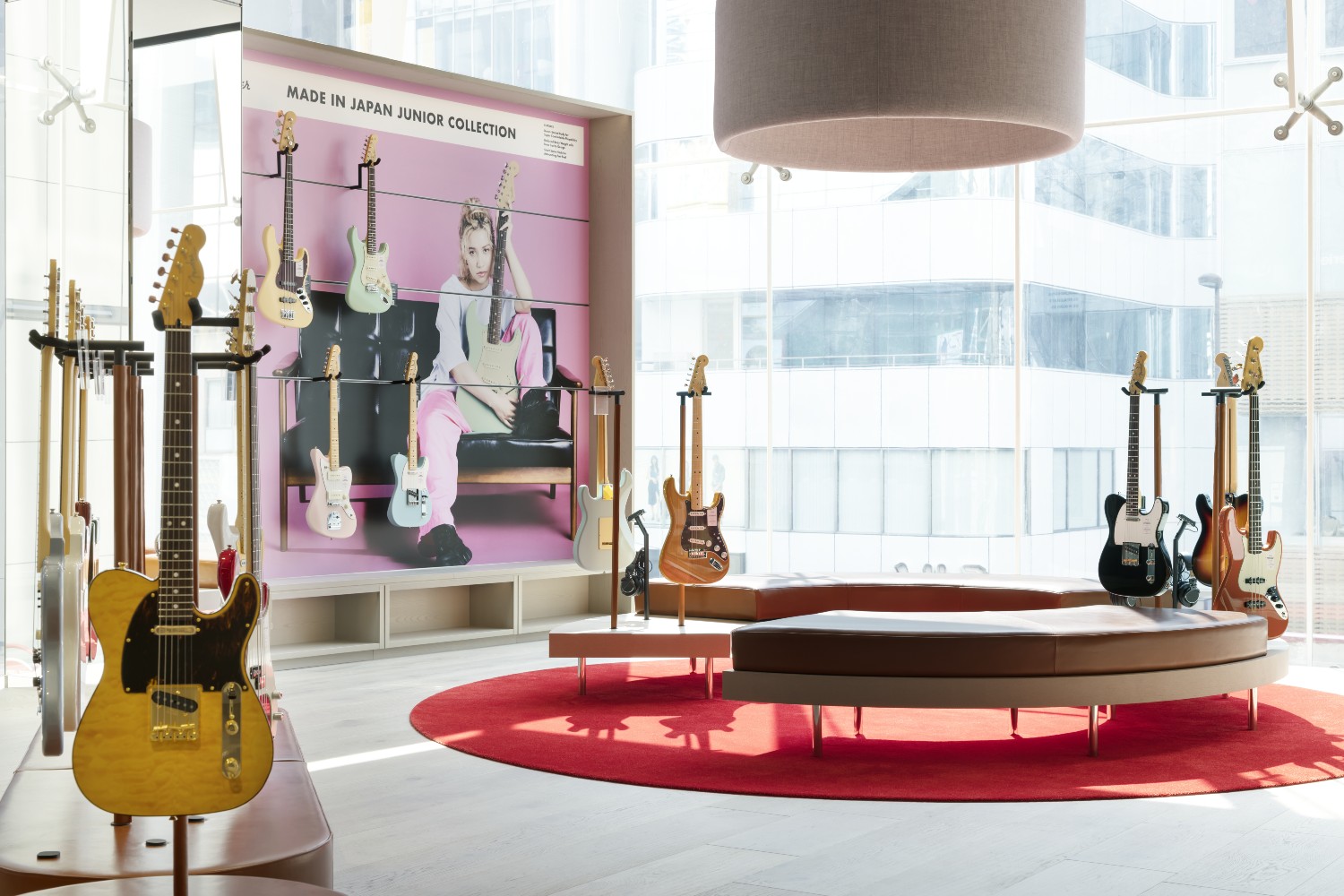
Alongside a stunning display of made in USA models, this floor also features what is arguably one of the store’s most exciting rooms – a completely soundproof space in which customers can test out Fender amplifiers.
“We have the biggest collection of our line of Fender amplifiers here,” says Cole.
“And we give people the chance to come up and try those amplifiers. We’ve got the pedal bar where they can sit and mess with all of our pedals, and they can crank it up. It’s all soundproof in the room – which is wonderful. A lot of times, in stores, amps just kind of get mixed all up together, all different brands. And so we really want people to be able to walk through, you know, very systematically, and understand the whole line of amps – what they mean… how they sound, heavier and lighter, the tube amps, versus the digital amps…”
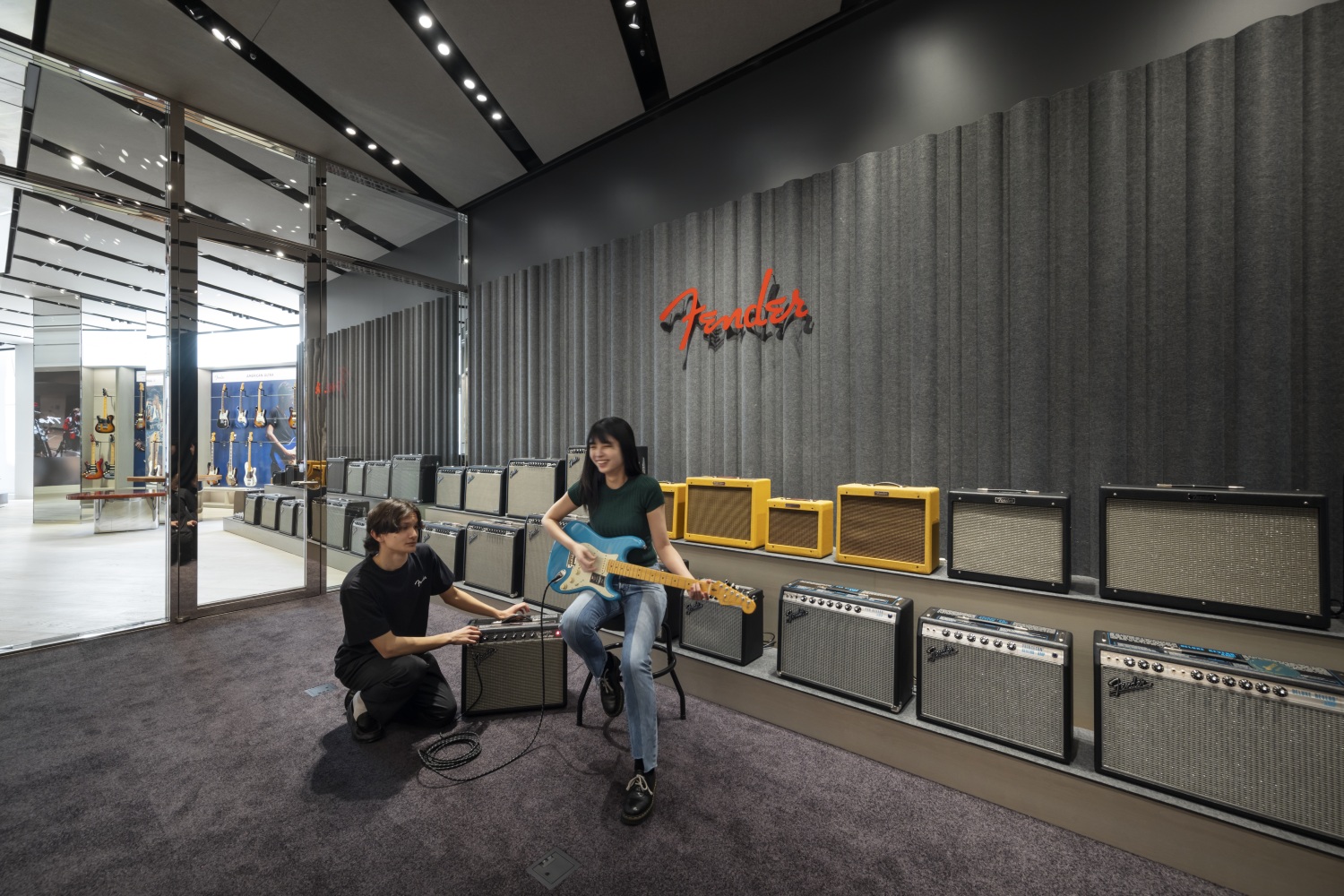
Speaking to the ways in which Japanese consumers specifically have been catered to within Fender Flagship Tokyo’s design, Mooney highlights the store’s basement floor, which, in the way of guitars, solely showcases acoustic models, and is also home to Fender’s first ever coffee shop, Fender Cafe.
“Specifically for the Japanese consumer… it’s the acoustic floor, because of the limited spaces available in Japanese homes, I think it’s going to be really important.
“This is the only place in the world where you’ll see a full floor dedicated to an acoustic presentation where, you know, you could sip a coffee, or a beer and experiment with a whole range of acoustic guitars.”
The basement floor also features a dedicated event space which is set to host a variety of immersive events for players and music lovers, the first of which took place at the store’s opening night celebration, with a host of talented Japanese performers, many of whom are also Fender affiliated – from Miyavi, to Rei and Kenji “Jiro” Hiro. Their portraits and signature models line the walls of the store alongside heritage icons of the likes of Cobain and Hendrix, evoking the universality of Fender guitars as an inspiring force for creatives across the globe.
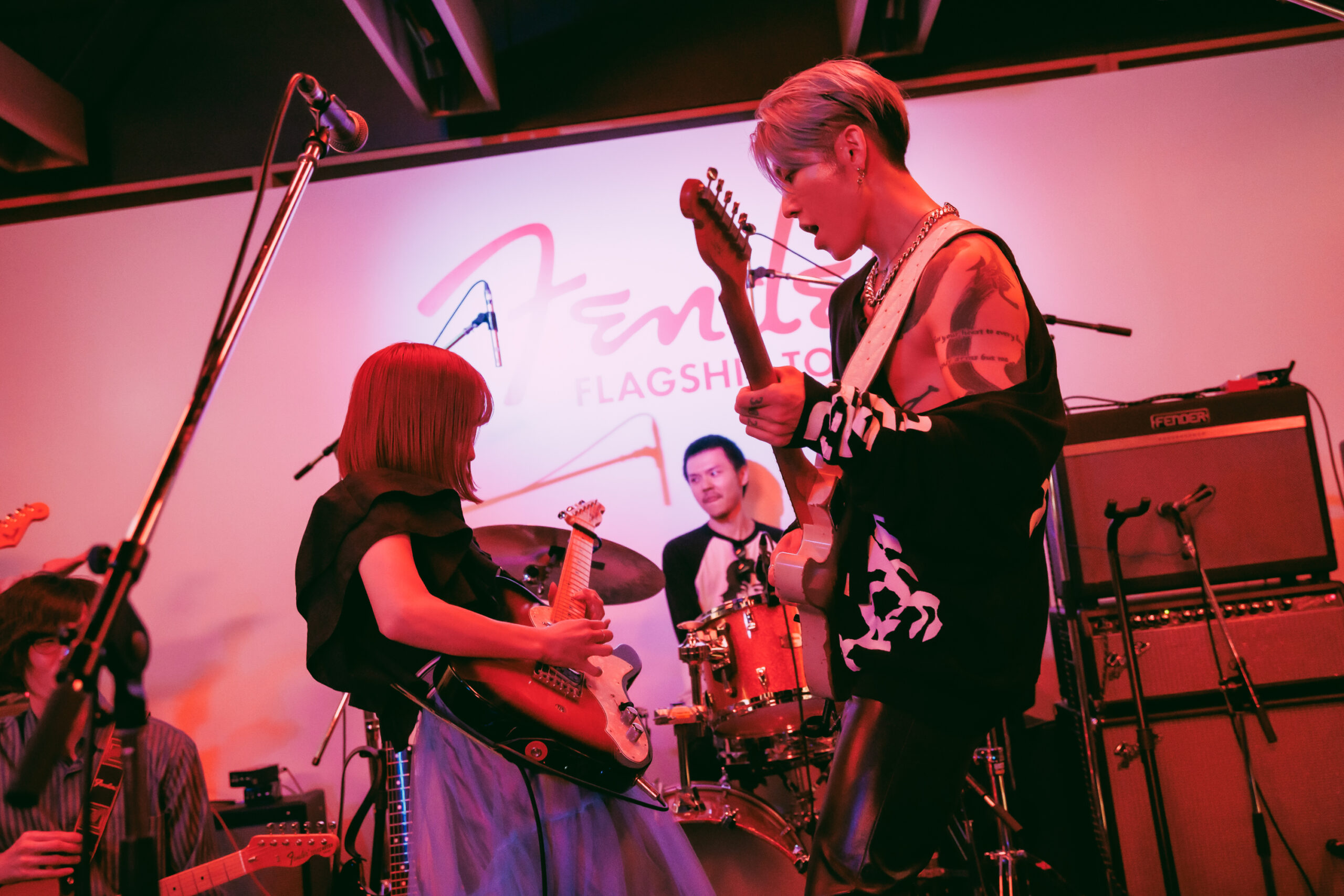
A Fender affiliated artist based in Mixdown’s very own hometown of Melbourne, Australia, also graced the store’s string of opening events – the Jaguar toting, ocker accented observationalist herself – Courtney Barnett. Sitting on a sofa in one of the store’s various cosy testing areas, equipped with what many will find to be a welcome addition – headphones for privacy – we speak about how many of Fender Flagship Tokyo’s design/layout innovations buck convention in a way that ameliorates some of the aspects of guitar shopping that have historically made many prospective buyers feel intimidated.
“It’s a stereotype for a reason… the scariness of a music store. And I think I’ve definitely experienced that. And even sometimes, like, these days, I go into a shop, and I don’t know if it’s just that maybe musicians and people who are musically inclined are a bit more emotionally aware… but sometimes in music stores, people are just assholes. So it’s obviously both ends of that.
“I think it’s easy to be intimidated and unfortunately put off, which I think is a real bummer, because if anyone goes – and I’m thinking especially about younger people – if you go in to a guitar store, and someone discourages you, it could be monumental, like you might never do that again.
“To be discouraged by that, because you don’t know enough about it. Yeah. It is so sad. And that should never happen. So it sounds like, you know, especially in this space, that everyone’s hyper aware of that. Mixing that encouragement with obviously, like, a retail space… It could only be a positive outcome for more people to feel encouraged.”
The shop’s storey layout is indicative of the wide web Fender’s current product offering casts, ascending from beginner acoustics on the basement floor, up what Cole refers to as “the stairway to rock and roll heaven” – the heaven in question being the most comprehensive Custom Shop presentation on the planet, flanked by gallery walls of instruments so intricate and awe-inspiring they could stand alone as works of fine art.
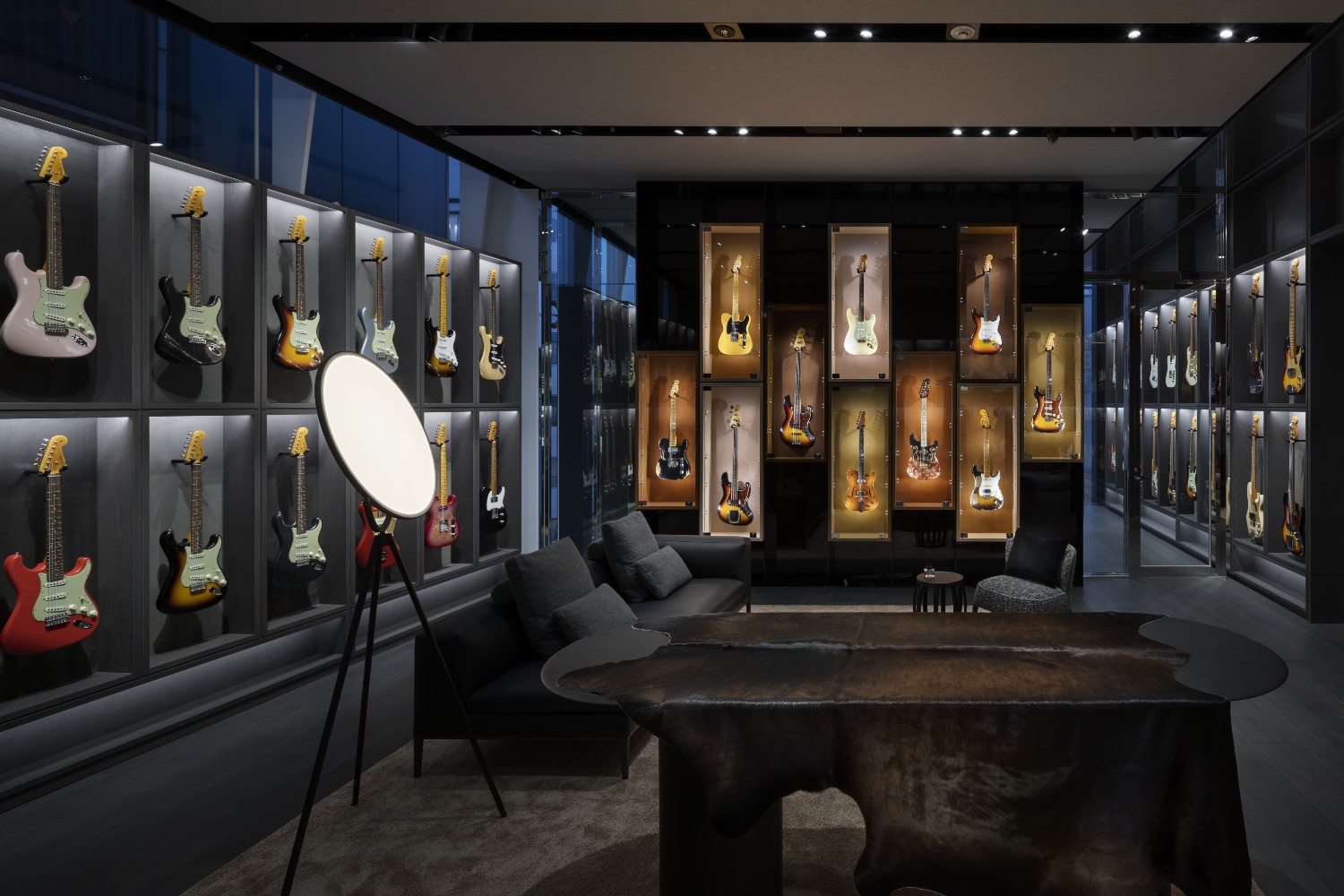
“The goal here with this store is to demonstrate to people, and to inspire people, not just musicians, but people who are in the industry as well, to think, wow, things could be different, and that this could be profitable too,” Cole adds.
“Yeah, so we wanted to make everything kind of… accessible, touchable,” Mooney concludes.
“The customers will tell us if we got it right or wrong in time, but we’re hugely interested.”
For more information about Fender Flagship Tokyo, head here.
